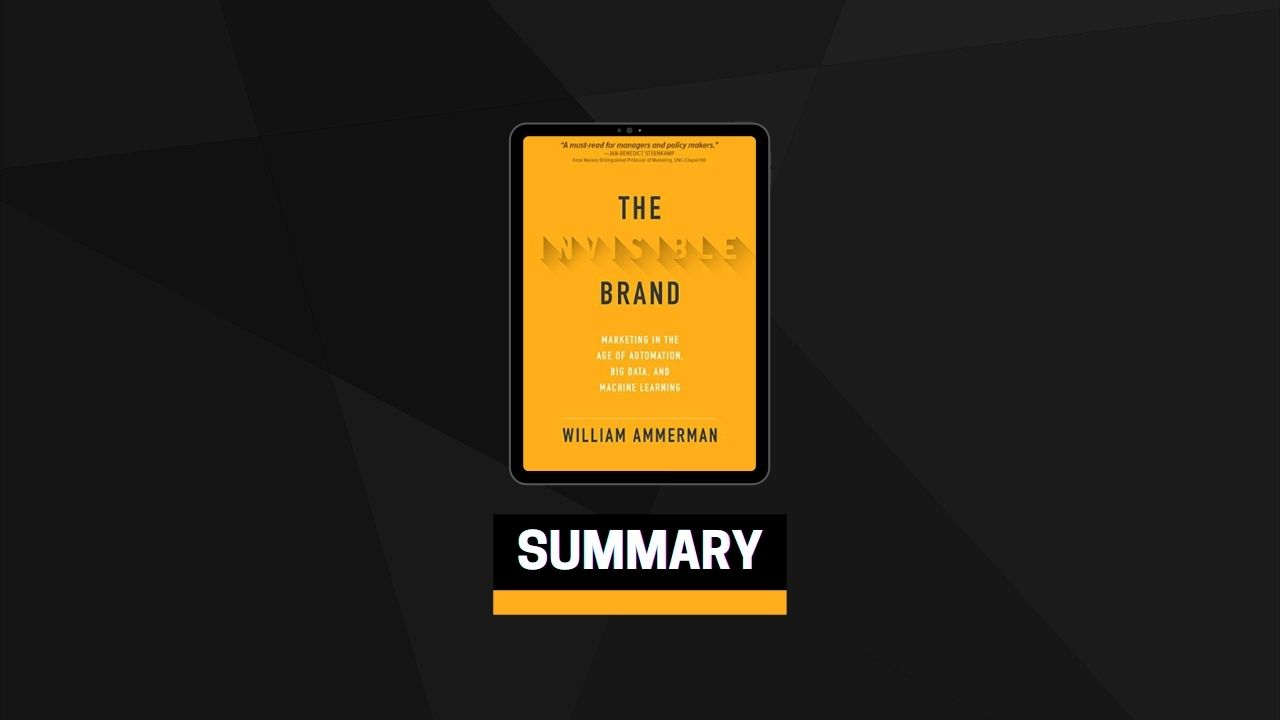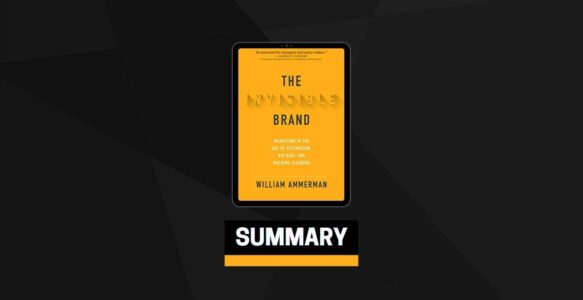The Invisible Brand Takes Over
Artificial intelligence is changing marketing in ways that will have wide-ranging impacts on every facet of our society. While we’re not yet at the point where AI agents are poised to take over the world, we are already witnessing the use of AI to influence people’s decisions—a trend that promises to produce far-reaching consequences for the marketplace and for consumers.
The hidden hand of marketers leveraging AI to influence the way we think and how we act is the Invisible Brand. It is enabled by four major innovations: personalized information, the science of persuasion, machine learning, and humanlike voice interactions, which have converged to create a new field.
call psychotechnology. It’s a development that businesses and consumers ignore at their own peril, whose impact will be felt across sectors as diverse as media, healthcare, finance, education, and government. If we are to better understand who controls the Invisible Brand and how it will develop, we first need to take a step back and examine its roots in the digital advertising industry.
The Roots of the Invisible Brand in Digital Advertising
The power of data analytics to predict, and the capacity for algorithms to learn, will entirely reshape the field of marketing.
AI is already helping optimize targeting, images, messages, and the method of delivery for every type of marketing message imaginable. For a single advertising campaign, a machine can optimize millions of ad impressions with a hundred versions of a message delivered in combination with a thousand different images targeting 50 different audiences in 10,000 locations to achieve the best results. No human could ever hope to tackle such a task—but a machine can do so with ease.
Through personalized information, the Invisible Brand is accelerating its ability to influence the way we think.
In fact, the messages aimed at us as individual consumers will be increasingly dictated by a combination of marketing automation and machine learning—all designed to persuade us in increasingly sophisticated, imperceptible ways.
Brands are willing to pay a premium for this capability, which has resulted in a vast demand for more data and information on consumers that can be used to fine-tune marketing strategies at a personalized level.
Persuasion Equations
Let’s pause and consider the vision that Andrew Wilson, the CEO of Electronic Arts, sees for the future of AI and video games. “From the minute I get up in the morning, everything I do has an impact on my gaming life, both discrete and indiscrete,” he said. “The amount of eggs I have in my Internet-enabled fridge might mean my Sims are better off in my game. That length of distance I drive in my Tesla on the way to work might mean that I get more juice in Need for Speed. If I go to soccer practice in the afternoon, by virtue of Internet-enabled soccer boots, that might give me juice or new cards in my FIFA product. This world where games and life start to blend I think really comes into play in the not-too-distant future, and almost certainly by 2021.”39
A near future similar to that described by Wilson would be a clear boon to marketers. It takes gamification—in which marketers persuade consumers using gamelike rewards and incentives—to the next level.
We’ve all encountered plenty of examples of this kind of gamification in marketing. A classic example is McDonald’s Monopoly game that has been around since 1987, which encouraged us to buy more burgers, fries, and shakes in an effort to obtain those elusive Park Place and Boardwalk tokens. Remember collections and completing the set? Powerful motivators—and McDonald’s proved they can be really effective at getting us to buy more fast food.
Marketers have long relied on the powers of persuasion to influence consumer decisions. Due to the emergence of AI, persuasion is evolving into much more of a science—a set of rules—that can be repeatedly deployed behind the scenes in ways that influence consumers’ emotions and brain chemistry. The science of persuasion is a key component of psychotechnology, and it promises to become an indispensable tool of the Invisible Brand.
We’re already seeing how this new field of science is deployed in the world of gaming, as well as how AI agents are increasingly learning from and leveraging these same rules to persuade and influence people in areas ranging from the workplace to social media and online learning.
Infinite Data from Smarter Things
The evolution of the Internet of Things—where just about everything connected to our lives transmits data about our behaviors—has unlocked new opportunities for marketers. Armed with increasingly detailed information about our online and offline lives, brands now have unprecedented abilities to develop deep and insightful profiles of individuals. That information can then be fed to algorithms with the goal of creating customized and personalized messaging designed to persuade people.
Algorithms can learn by being fed data about what works and doesn’t work, and they can adapt in real time to changing information—especially when they’re placed at the edge of where the data is being collected. Structured in neural networks, AI has the capability to learn in ways the designers don’t always understand. This has put us on the cusp of developing even more sophisticated tools of persuasion—as well as witnessing the emergence of machines that think and act in more human ways, and potentially unpredictable ways.
Marketing with Psychotechnology
The Invisible Brand is tapping into the power of psychotechnology to market to consumers. Digital media is being redefined as marketers now deploy focused, intimate, and dynamic messaging to promote their brands. The era of hyperpersonalization and microtargeting, enabled by artificial intelligence, is upon us.
One significant consequence of this shift is that the marketing world itself is being disrupted, forcing marketers to develop new AI skills and capabilities in order to keep up with their competitors. Machines are harvesting vast quantities of data about individual consumers and tailoring marketing messages for those individuals.
Nature Versus Nurture Versus Neural Networks
We now live at a time when computers have developed an influential role in our human development. People are wearing data-collecting technology and even embedding that technology under their skin. Many spend hours of their day living in simulated worlds powered by virtual reality where their behaviors are carefully collected and analyzed. Not only can computers collect our personal data, they can now build emotional relationships with humans that would be hard to distinguish from relationships people form with friends, family, and even pets. Computers now influence intimate decisions about dating and sexual relationships, and no aspect of our lives seems off limits.
People are growing more comfortable with AI-powered machines in their daily lives—while also creating powerful emotional bonds with these machines—and that has opened up new marketing opportunities for brands to explore. The rise of psychotechnology will continue to ripple out into every conceivable sector of our lives, raising new ethical challenges for marketers and consumers.
The Algorithmic Economy
Consumers are already seeing the impact of AI in many sectors of our economy, like autonomous cars, and there is further potential for psychotechnology to disrupt industries in ways that many overlook. In the years to come, psychotechnology promises to radically reshape how illness and disease are diagnosed and treated—while also giving new hope to those in need of constant care and companionship.
Psychotechnology will also help us make critical decisions that affect how we save and invest our money, and it will be at the heart of a radical transformation in education where AI agents act as our personal tutors throughout our lives and turn us into lifelong learners.
The broad penetration of psychotechnology will give the Invisible Brand significant reach into our lives. While there are many reasons to be excited about the positive opportunities this represents, there are also risks. The presence of psychotechnology raises concerns about individual privacy and autonomy and the government’s role in regulating the power of the Invisible Brand.
Privacy, Propaganda, and Politics
As more and more of our data is harvested for use in tailoring messaging for individuals, we must now confront the issue of who owns the data about us—and whether there should be limits on its use by the Invisible Brand. Unfortunately there are no easy answers or simple solutions to how society should regulate the expanding power of pyschotechnology. We’re entering unexplored territory. While there are now some examples of governments that are experimenting with laws regulating privacy rights, new questions have arisen regarding whether governments themselves can be trusted not to abuse the powers of psychotechnology.
Psychotechnology is a potent tool for propaganda, and consumers are persistently bombarded with personalized information designed to persuade them toward a particular point of view. Whether that power should remain in the hands of the market, distributed among various competing corporate and institutional interests, or whether that power should be centralized in the hands of powerful government bureaucrats is a question that has far-reaching implications. Nations like the United States and China may be headed to opposite ends of that spectrum. For individuals living in a world where thoughts and actions are increasingly influenced by the Invisible Brand, the answer has implications that go to the heart of who we are, even at a spiritual level.
Conclusion
To remain competitive in this new market, marketing professionals must remain alert and educate themselves about the innovations that are emerging to make psychotechnology such a powerful force. As consumers and citizens, we must inform ourselves and be aware of the opportunities as well as the dangers ahead. The potential exists for tremendous benefits for all of us, in areas as diverse as finance, healthcare, and education.
But psychotechnology is capable of hacking our reward systems, our reproductive urges, and even our religious impulses, and therein are profound ethical questions for us all to address. We must retain the ability to think for ourselves and emerge into the sunlight where we can see the Invisible Brand.


